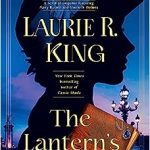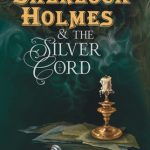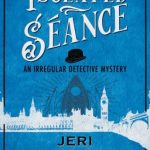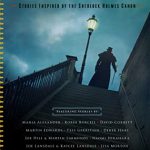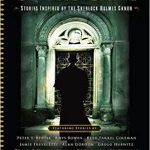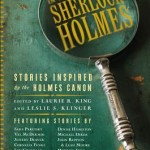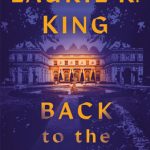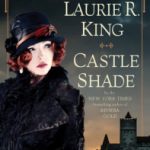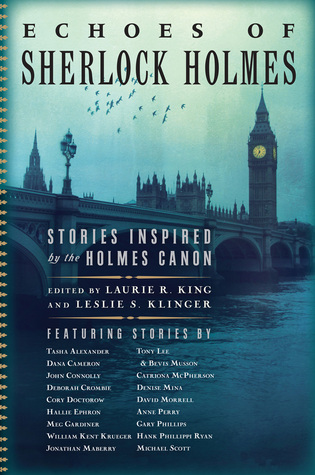 Echoes of Sherlock Holmes: Stories Inspired by the Holmes Canon by Laurie R. King, Leslie S. Klinger
Echoes of Sherlock Holmes: Stories Inspired by the Holmes Canon by Laurie R. King, Leslie S. Klinger Formats available: hardcover, ebook, audiobook
Series: Stories Inspired by the Holmes Canon #3
Pages: 368
Published by Pegasus Books on October 4th 2016
Purchasing Info: Author's Website, Publisher's Website, Amazon, Barnes & Noble, Kobo, Bookshop.org
Goodreads
In this follow-up to the acclaimed In the Company of Sherlock Holmes, expert Sherlockians Laurie King and Les Klinger put forth the question: What happens when great writers/creators who are not known as Sherlock Holmes devotees admit to being inspired by Conan Doyle stories? While some are highly-regarded mystery writers, others are best known for their work in the fields of fantasy or science fiction. All of these talented authors, however, share a great admiration for Arthur Conan Doyle and his greatest creations, Sherlock Holmes and Dr. Watson.
To the editors’ great delight, these stories go in many directions. Some explore the spirit of Holmes himself; others tell of detectives themselves inspired by Holmes’s adventures or methods. A young boy becomes a detective; a young woman sharpens her investigative skills; an aging actress and a housemaid each find that they have unexpected talents. Other characters from the Holmes stories are explored, and even non-Holmesian tales by Conan Doyle are echoed. The variations are endless!
Although not a formal collection of new Sherlock Holmes stories—however some do fit that mold—instead these writers were asked to be inspired by the Conan Doyle canon. The results are breathtaking, for fans of Holmes and Watson as well as readers new to Doyle’s writing—indeed, for all readers who love exceptional storytelling.
My Review:
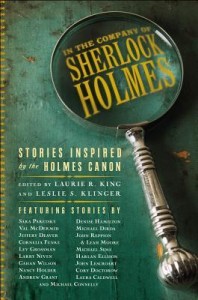 This collection is the third editorial collaboration of Laurie R. King and Leslie S. Klinger of newly commissioned tales that fall somewhere in the Sherlock Holmes tradition, if not the Holmes canon. Like the previous collections, A Study in Sherlock and In the Company of Sherlock Holmes, this outing too is a mixed bag. Some stories are memorable, some stories are wonderful. A few are both. And then there are some that either just didn’t move me or didn’t really feel like they belonged in this particular collection.
This collection is the third editorial collaboration of Laurie R. King and Leslie S. Klinger of newly commissioned tales that fall somewhere in the Sherlock Holmes tradition, if not the Holmes canon. Like the previous collections, A Study in Sherlock and In the Company of Sherlock Holmes, this outing too is a mixed bag. Some stories are memorable, some stories are wonderful. A few are both. And then there are some that either just didn’t move me or didn’t really feel like they belonged in this particular collection.
I do have several favorites this time around, more than in Company.
Where There is Honey by Dana Cameron drew me in because it feels like a somewhat earthier version of the real Holmes canon. Partly because of the Victorian era reluctance to deal with the earthier and seamier side of life, Holmes often comes off as a plaster saint, either a bit too good or a bit too unworldly to be true. The versions of Holmes and Watson in Cameron’s story feel more like real men, who have real bodies and face real emotional issues. Watson here clearly has PTSD that he keeps at bay through writing, at least some of the time, and likes a good fight. In this story Holmes is every bit as annoying as he can be, but also worries about paying his half of the rent, or Watson sometimes does that for him. The case is complex and nasty in its way, and our heroes enjoy providing the villains’ comeuppance. But they feel real.
Tasha Alexander’s Before a Bohemian Scandal reads like a story that wasn’t in the canon but should have been. In this story, we see Irene Adler’s affair with the Crown Prince of Bohemia from its starry-eyed beginning to its cold-hearted end. It’s impossible not to sympathize with Irene’s predicament, and to see just how nasty a man the future King of Bohemia turns out to be. This story is not just good on its own, but also gives depth to the canon story of A Scandal in Bohemia.
The Adventure of the Empty Grave by Jonathan Maberry is another story that could easily be encompassed by the original canon. It takes place during the Great Hiatus between Reichenbach Falls and The Adventure of the Empty House. In this tale a grief-stricken Watson visits Holmes’ empty grave and encounters a most surprising visitor – a man claiming to be the elderly C. Auguste Dupin, the living inspiration for the detective creation of Edgar Allan Poe. Dupin eventually convinces a skeptical Watson both of his reality and his purpose – to warn Watson that even though Moriarty is dead, his criminal enterprise is not. When Dupin disappears in the end, leaving behind the accouterments of his disguise, both the reader and Watson are left to wonder if he was a ghost after all, or a disguised visit from an absent friend.
Several of the stories in this collection are meta in one way or another. Holmes on the Range by John Connolly posits a library straight out of The Eyre Affair, where fictional characters retire to live out their “lives” after their authorial creators have died. The librarian is perplexed when Sherlock Holmes appears after the publication of The Final Problem and alarmed when Holmes is resurrected in The Adventure of the Empty House but also continues to inhabit this very special library. He fears the arrival of a second Holmes upon the eventual death of his author, and fears that having two of the same character will do irreparable harm to the delicate balance that allows the library to exist.
In Raffa by Anne Perry, an actor who plays Sherlock Holmes in one of the inevitable revivals finds himself attempting to serve as the “real” Holmes when called upon by a very desperate and very, very young “client”. Watching the actor become absorbed in the part of Holmes, and his part as rescuer, makes for a lovely little story.
Of the stories where a detective who is very definitely not Holmes uses Holmes’ methods to solve a case, my favorite is definitely Martin X by Gary Phillips. I loved this one because it transplants the methods and a bit of Holmes’ personality to a time, place and person who would initially be assumed to be as far from Holmes as possible. “Dock” Watson is a black private detective, occasional bodyguard and sometimes intelligence officer who is called to investigate the death of a fictional heir to Dr. Martin Luther King’s legacy. It is 1976 and New York City is still reeling from the “Son of Sam” murders. J. Edgar Hoover may be dead, but his heirs and his methods are still running the FBI, and are still conducting dirty tricks campaigns against the leaders of any movement that twisted brain found suspect – especially the Black Power movement. This Watson finds himself investigating not just the murder of a leader, but also the concerted effort by someone to make sure that the void in leadership stays void – by any means necessary. An undercover Sherlock Holmes, along with Watson, discover a chain of criminality that leads from street gangs in Harlem to someone very dirty in the CIA. This was a terrific story that made me wish there were more. Lots, lots more.
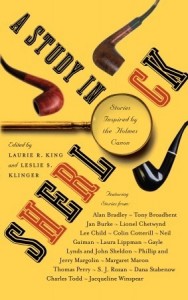 Escape Rating B+: This collection was every bit as good as the first one, A Study in Sherlock. Most of the stories here were at least enjoyable, if not memorable. And there were only a couple that either didn’t feel remotely Holmesian or just didn’t work for me. I hope there will be another editorial collaboration in this series, because each book introduced me either to new perspectives on Holmes, or new authors of mystery.
Escape Rating B+: This collection was every bit as good as the first one, A Study in Sherlock. Most of the stories here were at least enjoyable, if not memorable. And there were only a couple that either didn’t feel remotely Holmesian or just didn’t work for me. I hope there will be another editorial collaboration in this series, because each book introduced me either to new perspectives on Holmes, or new authors of mystery.
As a final note, I’m haunted by Cory Doctorow’s The Adventure of the Extraordinary Rendition. This tale of a 21st century Holmes up against the modern security state embodied by his brother Mycroft felt all too possible. And all too frightening because of it.





